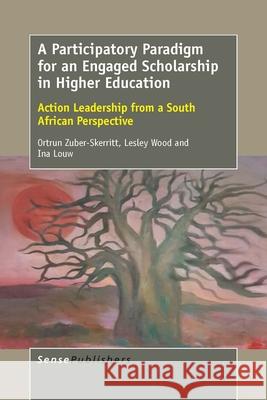A Participatory Paradigm for an Engaged Scholarship in Higher Education » książka
A Participatory Paradigm for an Engaged Scholarship in Higher Education
ISBN-13: 9789463001823 / Angielski / Miękka / 2015 / 284 str.
A Participatory Paradigm for an Engaged Scholarship in Higher Education
ISBN-13: 9789463001823 / Angielski / Miękka / 2015 / 284 str.
(netto: 178,07 VAT: 5%)
Najniższa cena z 30 dni: 180,57
ok. 22 dni roboczych.
Darmowa dostawa!
This book provides a comprehensive conceptual framework, case studies, workshop processes and designs for academic development programs supported by two key concepts: Participatory Action Learning and Action Research (PALAR) - a conceptual integration of action learning and participatory action research - and action leadership. PALAR is conceived as a philosophy, a methodology, a theory of learning and knowledge creation, and as a facilitation process. Action leadership involves collaboration, action, concern and responsibility for others, rather than a position of power and control over them. It is participatory, strategic, ethical and non-hierarchical.The authors, PALAR leaders, have drawn upon their extensive experience in a South African context to provide what I have found to be the strongest response to the call for a reconsideration of traditional academic scholarship in favour of a scholarship of discovery, integration, application, and teaching. This has clear international significance in guiding university faculty worldwide in their efforts to develop an engaged scholarship informed by theory that is critical, phenomenological, experiential, action-oriented, strengths-based, and grounded.Dr Joseph M. Shosh, Professor and Chair, Department of Education, Moravian College, Bethlehem, Pennsylvania, USAIt is a must-read for academics, academic leaders and academic developers who wish to make higher education more relevant, authentic and effective.Professor Brenda Leibowitz, Chair, Teaching and Learning, University of Johannesburg, South AfricaFoucault argued for power being exercised by all in an organization or society, and these authors not only encourage such action but provide processes and examples of how to go about it.Dr Pip Bruce Ferguson, Teaching Enhancement Unit, Dublin City University, IrelandWith the increased focus on scholarship and more importantly integrated scholarship, this book will serve as an inspiration to stimulate the possibility of approaching knowledge creation in a scholarly manner. As such this book makes an important contribution that inspires and provides tools to realize the vision of sustainable development and transformation in the South African context.Dr Ruth Albertyn, Centre for Higher and Adult Education, Faculty of Education, University of Stellenbosch, South Africa











